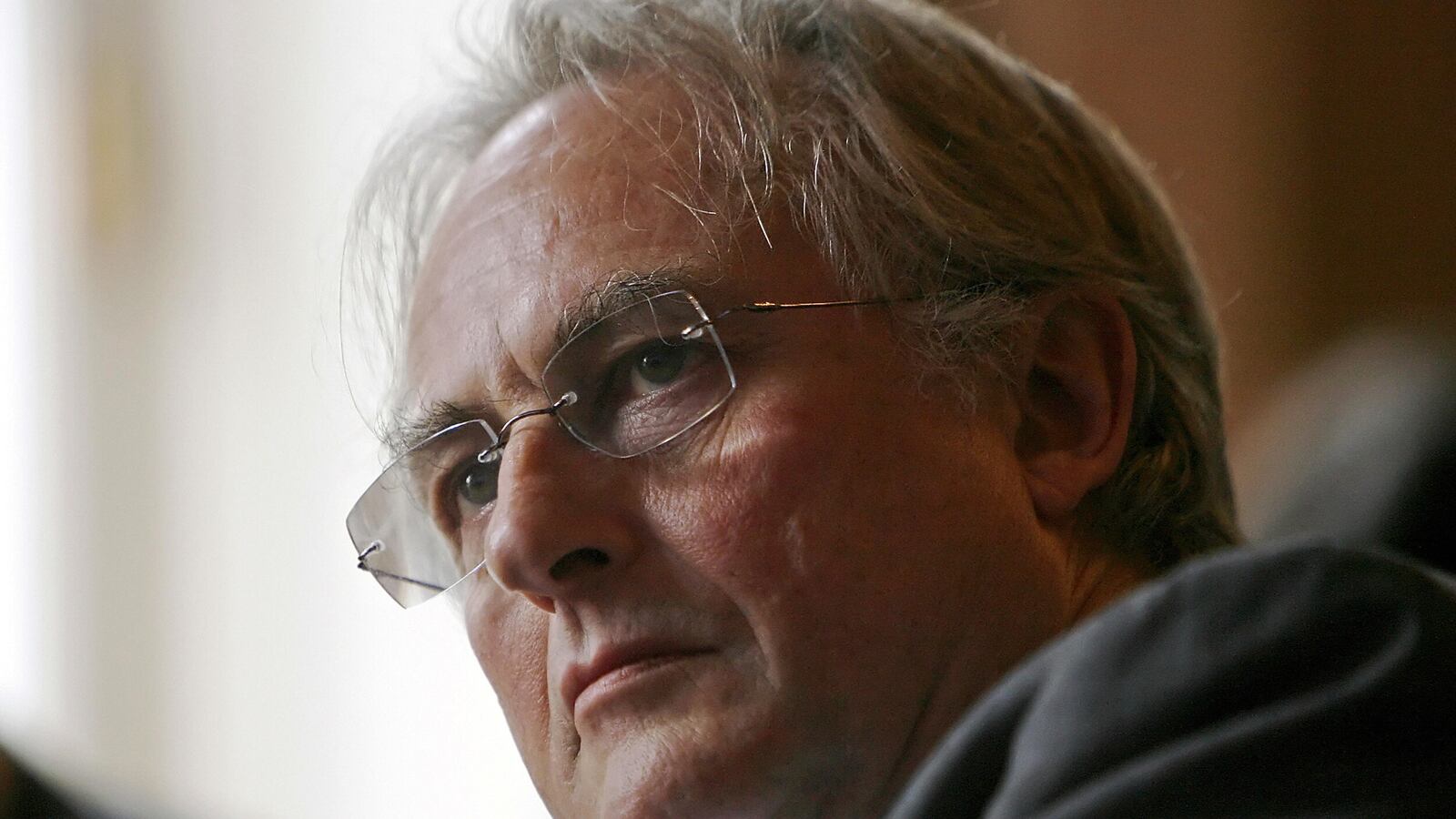Lately, Richard Dawkins seems to scan the world for sore spots, take a good poke, and revel in the ensuing outcry. A few weeks ago, he proclaimed that stranger rape is worse than date rape. Last Wednesday, he tweeted that if a fetus was diagnosed with Down syndrome, the mother should “abort it and try again. It would be immoral to bring it into the world if you have the choice.” Predictably, he was deluged with angry responses; as of this writing, he is still responding to critics.
During this latest battle, his most vocal opponents have been pro-life, but you don’t have to be pro-life to take issue with what he’s been saying. If you believe, as Dawkins purports to, that your moral opinions should be informed by empirical evidence and logic, then that alone is excellent reason to object to the totality of what he’s been saying.
Each academic I interviewed for this story—all of whom were critical of Dawkins’ recent Twitter comments about abortion—emphasized their admiration for Dawkins’ scientific and popular writings. There’s no question Dawkins is intelligent, so it’s not clear why, despite lacking a background in bioethics, he thought himself qualified to dispense advice on a nuanced bioethical issue.
Ari Kohen, associate professor of political science at the University of Nebraska-Lincoln, maintains a highly entertaining blog devoted, in part, to terrible apologies—Dawkins’ non-apology apology among them. As Kohen points out to The Daily Beast, Dawkins never actually apologizes for what he said. He only apologizes for the Twitter-storm that followed.
In the apology Dawkins says, “Given a free choice of having an early abortion or deliberately bringing a Down child into the world, I think the moral and sensible choice would be to abort…I personally would go further and say that, if your morality is based, as mine is, on a desire to increase the sum of happiness and reduce suffering, the decision to deliberately give birth to a Down baby, when you have the choice to abort it early in the pregnancy, might actually be immoral from the point of view of the child’s own welfare….Having said that, the choice would be entirely yours and I would never dream of trying to impose my views on you or anyone else.”
Dawkins’ belief that we should maximize happiness and minimize suffering seems to be a moral theory known as “act-utilitarianism.” For an act-utilitarian, an action’s morality can, in theory, be demonstrated empirically. To discover if an act is moral or immoral, you simply measure the amount of happiness or suffering it causes. The more suffering an act causes, the more immoral it is; the more happiness an act causes, the more moral it is.
When you really try to understand what Dawkins is saying in his apology, however, you realize that his thoughts are not even fully coherent. He says that continuing the pregnancy is immoral because the child would better be off if she had never been born—but he provides no evidence for this, and it’s flat-out implausible that Down syndrome renders a life so wretched that it’s not worth living. Earlier in the same sentence Dawkins says he believes morality is based on increasing “the sum of happiness,” which presumably means the sum of everyone’s happiness. That is, an action is immoral when it makes the entire world worse off. If that’s true, and he has stated he thinks it’s immoral knowingly to give birth to someone with Down syndrome, does he think the mere presence of people with Down syndrome increases suffering in the world?
“He shifts from an emphasis on maximizing happiness to focusing on the well-being of a single, non-existent individual,” Paul Raymont, an instructor of philosophy at the University of Toronto, writes in an email to The Daily Beast. “It’s as if he realized, as he was expressing this idea, that it didn’t sound very nice, so he hastily threw in the claim that the Down syndrome child is better off not existing.”
In more recent tweets, Dawkins has been suggesting that with every action, we change the future children who are born. Since anything we do changes our future children, why shouldn’t we maximize the happiness experienced by future children? seems to be what he’s asking. Raymont points out that random occurrences that change the future are entirely different from a decision to terminate a pregnancy due to a Down syndrome diagnosis. The latter involves deciding what kind of child to have. Raymont adds, “For Dawkins to publicly recommend doing this and to say that the alternative is immoral is for him to send a very clear message about existing people who have Down syndrome—he’s saying that they’re morally inferior to the rest of us and that future generations would be much better off without their kind. He may not have intended to send that message, but he has done so (whether he knows it or not). He has also, whether he knows it or not, expressed moral disapproval of parents who had prenatal tests but decided to go ahead and have the Down syndrome baby.”
It sounds very tolerant when he says he is unwilling to “impose [his] views,” but it’s also unclear. Short of the vigilante kidnapping or coercion of pregnant women, the only way he could impose his views on others is demand that his views become law. “When he says he wouldn’t dream of imposing his beliefs on others, I take it he means that having a Down syndrome baby (instead of aborting) shouldn’t be illegal,” Raymont says. “Okay, but he’s still saying that it’s immoral. Obviously, he’ll never be pregnant and so won’t ever face the question of whether to abort. So, he must mean that it’s immoral for others not to abort the Down syndrome child. Again, he might have sensed how harsh that sounds and, so, decided to soften the blow by the ‘wouldn’t dream’ remark. But, again, by trying to soften the expression of his view, he muddles it.”
Concluding his sort-of-apology, Dawkins says, “What I was saying simply follows logically from the ordinary pro-choice stance that most of us, I presume, espouse.” Actually, it does not follow logically. If someone is pro-choice, that means he or she thinks abortion should be legal. Someone who is pro-choice does not necessarily “advocate (legal) obligatoriness, nor presume a moral duty to abort fetuses with Down syndrome, or any other condition for that matter,” Christian Munthe, professor of practical philosophy at the University of Gothenburg in Sweden, tells The Daily Beast. “There are, in fact, even advocates of strict official Catholic ethical teaching on abortion that on pragmatic grounds advocate pro-choice (so-called liberal catholic bioethicists).”
It is also possible for someone to be pro-choice and think abortion is generally permissible, but not for certain reasons. He or she may think it immoral to terminate if the decision was based on the fact that a fetus was discovered to be gay, or predisposed to obesity, or dark-skinned, or female. Or disabled. Indeed, Dawkins is so far from the ordinary pro-choice stance that there is no major bioethicist or philosopher who would agree—without far more caveats than Dawkins provides—that the “moral and sensible” thing to do is abort if a fetus is diagnosed with Down syndrome.
Even those philosophers who advocate views closest to Dawkins’ don’t go where he goes. Peter Singer, professor of bioethics at Princeton, has felt the wrath of disability advocates for his positions on abortions and infanticides of those with disabilities, but he is careful to stress that the morality depends on the specifics of surrounding circumstances.
Julian Suvalescu, professor of practical ethics at Oxford, has advocated a position he calls “procreative beneficence.” He argues that given a choice, a parent should choose a child most likely to live the life with the greatest wellbeing—but knowing only that a fetus has Down syndrome is not enough to determine its wellbeing. “[Suvalescu’s] procreative beneficence does not in any simple way imply anything about fetuses with three copies of chromosome 21,” says Munthe. “It is perfectly consistent to argue that, had I some information that a future child of mine would grow up to be a splendid popularizer of evolutionary biology and effective critic of institutionalized religious bigotry, but also an inconsiderate and arrogant philosophical dilettante, and had the choice to have another child possessing the first two but lacking the latter traits, procreative beneficence may very well recommend that I chose this other child.”
Ultimately, beyond Dawkins’ muddled arguments, the main problem is that he has no evidence. No empirical data support his claim that the birth of a baby with Down syndrome makes the world—or the baby—unhappier. In fact, all the evidence points to the contrary. “All he would have had to do was a quick search online,” observes Kohen. “The numbers don’t bear out what he says at all.” Indeed, as Kohen points out in a blog post, the numbers suggest the opposite. The vast majority of parents and siblings of people with Down syndrome believe their lives are better for it. The vast majority of people with Down syndrome also say they are happy with their lives.
Among the people who, according to Dawkins, have misunderstood Dawkins, are “those who took offence because they know and love a person with Down Syndrome, and who thought I was saying that their loved one had no right to exist. I have sympathy for this emotional point, but it is an emotional one not a logical one.” Apparently, he thinks people who love someone with Down syndrome simply must be clouded by sentiment, and unable to see reason. But for an act-utilitarian, the emotions of those who know and love people with Down syndrome are not muddying the issue; on the contrary, they are crucial data points. These people are telling him what for some reason he does not seem to want to hear: that their happiness is increased with someone with Down syndrome in the world.
“We all know that Dawkins is very smart and can write great, wonderfully clear books about science. So, when his statements become so sloppy and confused, I can only conclude that he hasn’t invested much effort in formulating his ideas. He hasn’t put in the effort because he thinks ethics is pretty easy,” says Raymont. “He’s well known for insisting on the importance of gathering the relevant empirical data before settling one’s mind about something. But on the question of abortion and Down syndrome children, he seems not to have seen any need to consult the evidence.”
Dawkins’ impressive academic background, and his implications that any who disagree with him are simply not smart or logical enough, may intimidate some who would dissent. They may lead some of his supporters to think that those who disagree are so emotionally overwrought that they are incapable of thought. However, in this case, it is Dawkins who needs to consider the logical implications of what he’s saying.






